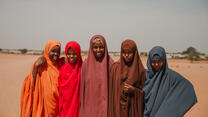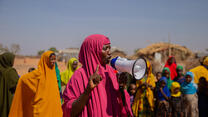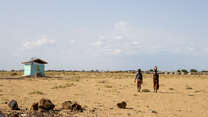IRC urges global donors to fully fund Ethiopia's humanitarian appeal
- More than 21 million people in Ethiopia need urgent humanitarian assistance.
- The IRC urges world leaders to fully support communities in Ethiopia affected by both conflict and climate change.
- Ethiopia’s 2024 Humanitarian Response Plan has received just 4% of its necessary funding.
Country facts
- Population: 123.4 million
- People in need of humanitarian support: 21.4 million
- People internally displaced: 3.1 million
- Rank in Human Development Index: 175 of 191
IRC response
- Started work in Ethiopia: 2000
The IRC delivers clean water and sanitation, essential supplies, protection services for women and girls, and other emergency assistance to vulnerable Ethiopians and refugees living in Ethiopia while supporting government-provided health services.
Ethiopians are seeking to recover and rebuild their lives in the wake of an unprecedented drought that lasted 2020-2023. While the total number of people in need of humanitarian support has decreased, economic pressures, additional climate shocks, conflict and regional instability hinder the nation’s recovery.
Although Ethiopia’s Tigray region has experienced relative peace since November 2022, concerns over transitional justice and the continued tensions over the status of Western Tigray persist, suggesting conflict could resume. Meanwhile, the ongoing conflict in Sudan has forced refugees to flee to Ethiopia, contributing to rising humanitarian needs across the Ethiopian-Sudanese border region.
Conflict has also impacted Ethiopia’s economy, contributing to rising food prices as the country recovers from long standing drought and one of the largest locust outbreaks in decades, which impacted the harvests of at least 1 million Ethiopians.
The number of critically food insecure people will continue to grow over the next few months reaching a peak of 10.8 million during the July-September lean season. Heightened support is necessary to avert a humanitarian catastrophe.
The IRC’s mission is to help people whose lives and livelihoods are shattered by conflict and disaster to survive, recover and gain control of their future.
Since 2000, the IRC has been aiding refugees from neighboring countries and Ethiopians in crisis-affected and underserved communities. Since then, we have expanded to provide a wide range of assistance for refugees living in camps and for vulnerable Ethiopian communities throughout the country. In 2013, the IRC opened the largest water system for any refugee camp in the world.
Ethiopia continues to grapple with conflicts and climate shocks that are taking a toll on its vulnerable populations. In response, the IRC has adopted a multifaceted approach, combining emergency relief with long-term resilience-building initiatives.
The IRC is focusing our efforts in crisis-affected communities by:
- providing cash and basic emergency supplies such as household kitchen sets, blankets, buckets, and jerrycans, as well as supplies to meet the specific needs of women and girls;
- building and maintaining safe water supply systems and sanitation facilities;
- educating communities on good hygiene practices to prevent the spread of disease;
- supporting government partners and community workers in primary health care clinics on preventing and treating common childhood illnesses and addressing family planning needs;
- empowering women through health, protection, psychosocial and legal needs, while working to address and prevent gender-based violence;
- working on a multi-sector approach to Education in Emergency Response with learning through practices to improve the learning outcome of conflict-affected children;
- supporting the safety, and resilience of children in refugee and host communities through child protection prevention and response interventions.
It is absolutely imperative that escalating tensions and conflict do not prevent the delivery of humanitarian aid. Resources are needed to rapidly scale up and sustain response efforts, including in areas where national systems and public infrastructure have been disrupted by conflict.
The IRC will continue to provide a wide range of emergency assistance and long-term support for vulnerable refugee and Ethiopian communities—including at-risk groups such as unaccompanied children and people with disabilities—to help them cope with and recover from crises. An opportunity exists for the IRC to work alongside other organizations and the Ethiopian government to find durable solutions for displaced populations, providing services and support to enable those who desire it to return to their homes.





